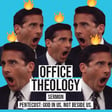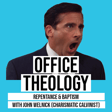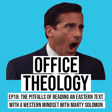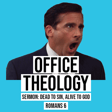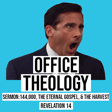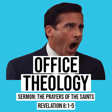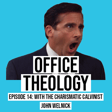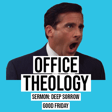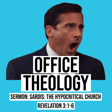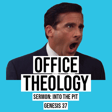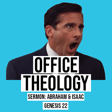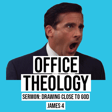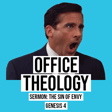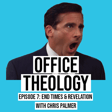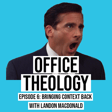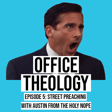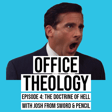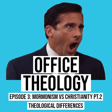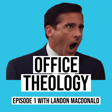Become a Creator today!Start creating today - Share your story with the world!
Start for free
00:00:00
00:00:01

Episode 2: Pt 1 of Mormonism vs Christianity (Mormonism explained)
In this episode, we will cover a handful of topics to answer the question of "What is Mormonism?"
Topics Covered:
- The Origin of LDS
- The LDS Texts (KJV, Pearl of Great Price, Book of Mormon, & Doctrine & Covenants)
- The Modern Day Prophet
- The Open Canon of LDS
Transcript
Mormonism vs. Christianity: Beliefs and Skepticism
00:00:01
Speaker
from their website, Revere the Bible. They study it and believe it to be the word of God. However, they do not believe the Bible, as it is currently available, is without air. So they would say, yeah, we believe and we study the Bible, but they don't believe that it's without air.
00:00:20
Speaker
All major deviations from Orthodox Christianity and Orthodox beliefs starts with the very fact of questioning the validity and the structure and the integrity of the Bibles.
Podcast Introduction: Office Theology on Mormonism
00:00:36
Speaker
Hey, well, welcome to Office Theology podcast in conversations. We are diving into the hot take today of Mormonism versus Christianity. This is part one of at least two, maybe more. And today I have with me Mrs. Office Theology. Hi, I am not the theologian of the family. So I am here to remind him to explain it to me like I'm five.
00:01:03
Speaker
that's right Michael Scott Scott all day yes but on a more serious note you guys don't know my husband and I think a lot of you follow the
00:01:12
Speaker
Instagram as mostly comedic relief, but he cares and he put a lot of thought and time and effort into this podcast. So I hope it blesses you
Podcast Intent: Addressing False Doctrines
00:01:25
Speaker
guys. Amen. Well, thank you for saying that. Happy you're here. OK, so a few disclaimers before we get cruising. The first is I'm not on like any sort of witch hunt to demolish and shame people. Honestly, it's probably the opposite.
00:01:42
Speaker
My goal is to show and expose some false doctrine that leads to false hope. I'm fully aware that there are people who are LDS that hold these topics and doctrines very close to their core. And I'm coming to this with as much grace and humility as possible.
Guest's Mormon Upbringing
00:02:04
Speaker
not coming to beat you over the head with you're wrong I'm right that's not it I understand that there's a deep deep deep rooted belief system in life that you've built off of these things and so I think to clarify that and then lastly all of the quotes that I have about LDS
00:02:23
Speaker
are from churchofjesuschrist.org and other LDS backed websites. So like BYU has forms, different things like that. I have no interest in taking these quotes out of the context they were written just to prove my point as honestly, I don't think that is needed. Okay, so we're gonna start with your story. You grew up in a Mormon and LDS family. So tell us a little bit about that.
00:02:54
Speaker
Yeah, so I was raised LDS as long as I can remember into my childhood. Did all the things, I was in Boy Scouts, I was baptized at eight, family was sealed in the temple, so that way we can go back to our own spirit children state, so that's gonna be dope. Sorry, a little bit of sarcasm there.
Humorous Mormon Dance Story
00:03:14
Speaker
Went around collecting the temple tithe, my parents wore their temple garments, all that different stuff.
00:03:20
Speaker
Probably one of my favorite memories of growing up Mormon is they put on this dance for young men and young women. Basically, it's like the youth ministry of LDS Church and it's Mormon hoco.
00:03:33
Speaker
Yeah, Hoko for maybe those international people is homecoming.
Origins and Leadership of LDS
00:03:37
Speaker
It's a big dance at high schools. And they came home from the dance and it was just full blown drama. They were fighting. Yeah, they were fighting. I had two older sisters. The oldest one danced with my other sister's ex-boyfriend at the Mormon dance.
00:03:54
Speaker
Party, foul. And so they were yelling at each other. My sister called my older sister the B word. My mom got mad. And then I was just sitting there laughing at it. And so that's all you need to know about my childhood being raised LDS. It's really less than you do with the church. But it's just a fun tidbit. Oh yeah. It was a hilarious moment that is forever ingrained in my mind.
00:04:16
Speaker
Okay, so there's a lot of information. This is just part one, like you said. Today, what are the basics that we're gonna be covering? Yeah, I think this is important to get up front. The origins of LDS.
00:04:30
Speaker
We're going to talk about all the LDS texts. So there's the Book of Mormon, Pearl of Great Price, Doctrine and Covenants. And so we're gonna make sure to break down all of those things. We're gonna talk about how they have a modern day prophet and how their leadership structure works, as well as the open canon of the Latter-day Saints, which we'll get into about all the extra biblical texts they have in addition to their King James version of the Bible.
Joseph Smith's Visions and Christian Sects
00:04:57
Speaker
Yeah, so the first one that we mentioned there, the origin of the Latter-day Saints. So if you don't know, or if your only context for Mormonism is from South Park, let me give you an explanation and an understanding of kind of where they came from. So Joseph Smith was born in Vermont in the early 1800s. He moved to New York.
00:05:22
Speaker
Just to clarify, Joseph Smith is the founder of Mormonism. Correct. Okay. Yep. Just get that all the way. There we go. He was exposed to different revival movements around that time. Most of his family was actually Presbyterians, however he leaned more Methodist.
00:05:39
Speaker
In the recollection of all this, he said he was bothered by the many variations of Christianity. And at one revival meeting, a preacher quoted out of James asking if any of you lack wisdom, just ask God. And so he took that to heart. So he was 14 years old at the time, went home, reflected on these words and went into the woods to pray. And so this is where, now according to Mormon tradition, this is where Joseph Smith had his very, very first vision.
00:06:08
Speaker
In his first vision, Joseph Smith claimed to see two personages. One, God the Father, pointed to the other ones, and this is my beloved son here, him, him being the Mormon Jesus. So then Joseph Smith inquired to these people about what sect he should join of Christianity, and they answered none of them, for they were all wrong.
00:06:30
Speaker
So he saw a vision with two people, one being, quote, God the Father, and the other being Jesus, his son, and he asked them,
00:06:41
Speaker
Which Orthodox Christian denomination to join and they said none of them just to
Comparing Joseph Smith to Apostle Paul
00:06:46
Speaker
clarify. Because they were all wrong. And so then a few years later Mormons believe that Joseph Smith received another vision and in this vision the angel Moroni told Joseph Smith where the golden plates were buried. But what's interesting is I feel like we need to have a quick
00:07:01
Speaker
scripture break here Galatians Paul is warning the Galatian church about this he says but even if we talking about the Apostles and disciples at that time or an angel from heaven should preach to you a gospel contrary to the one we preach to you let him be accursed yeah so he's warning against false prophets in false gospels mm-hmm and
00:07:29
Speaker
It's interesting that from our perspective, that's exactly what happened to Joseph Smith. Yeah, another angel or an angel came and preached to Joseph Smith another gospel, but they would say because the Book of Mormon says another testament of Jesus Christ. So even the words are done very well.
00:07:51
Speaker
carefully and I would say it's crafty but it's interesting because the very thing that Paul is warning us against is the foundation of what Mormonism is built on. Yeah, the Bible is very clear that Satan is the great deceiver and that he often disguises himself as light and so for me it's just a huge red flag just right there that
00:08:15
Speaker
this false prophet not only gave a false gospel to Joseph Smith, but he also disguised himself as a literal angel, just like the Bible warns us about.
LDS Beliefs on Polygamy
00:08:25
Speaker
And for me, that's just a huge red flag. Yeah, and I think to maybe give
00:08:33
Speaker
I don't know if grace is the right word, but perspective is like, we're looking at from the outside looking in. And sometimes when you're in the middle of this, and if you're LDS and listen to this, you might have had a really hard time with what was actually just said, and I get that. I get why it's so hard to hear that.
00:08:49
Speaker
But I think it's good to maybe step back for a moment and listen to the Scriptures. When I say Scriptures, I mean the Bible, and so we'll even dive into that a little more. So back to the story. The plates were revealed to Joseph Smith around 1827, and he was also provided with two reading crystals so he could translate the plates which he claimed were written in hieroglyphics.
00:09:12
Speaker
In 1830 he not only published the Book of Mormon, we'll break that down in a little bit, but he also founded it was called the Church of Christ but then he changed it to the Church of Jesus Christ of Latter-day Saints. So eventually he kind of moved around but where he landed was in Illinois where he tried to live out this utopian society instituted
00:09:34
Speaker
polygamy and said Joseph Smith has about 40 wives. I'm married to one. I love you and I don't want more than one. I couldn't imagine me married to 40 women. Sounds like a daunting task. So this is from the LDS website on just, we kind of touched on polygamy, but I want to talk about plural marriage from their website.
00:09:59
Speaker
So it says, Latter-day Saints believe that monogamy, the marriage of one man and one woman is the Lord's standing law of marriage. But this is where it gets weird. In biblical times, the Lord commanded some of his people to practice plural marriage. The marriage of one man and more than one woman, some early members of the Church of Jesus Christ of Latter-day Saints also received and obey this commandment given through God's prophets.
Joseph Smith's Arrest and LDS Split
00:10:27
Speaker
And this just has like a thousand red flags and warning signs and thing that pop up when I hear this because we are studying through Genesis and there's so many moments of polygamy and it's outside of God's design and the original creation with Adam and Eve. And in the midst of this polygamy, there's sheer chaos. Just look at,
00:10:54
Speaker
Jacob and his Leah, Rachel, and then his two concubines and then the 12 sons of the 12 tribes of Israel. There's just so much chaos and tension and brokenness that came out of plural marriage. So it's very interesting that they say, well now, and it's one man, one woman, but God can change that command depending on who it's for. And to me, that just feels like it lacks a little bit of integrity.
00:11:22
Speaker
Yeah, I'm unsure where they got that. In biblical times, the Lord commanded some of His people to practice plural marriage because we see plural marriage, but then when you read Scripture, everything that we read is not descriptive or prescriptive of how we need to live now. A lot of it is cautionary tales.
00:11:41
Speaker
All right, so moving on, Smith and his brothers were, his brother were arrested in 1844 and later a mob stormed in and killed both of them and Mormons consider him a martyr. After his death, there was a fracture in the LDS community. Some people separated and called themselves Josephites and began this quote, reorganized church in Missouri.
00:12:05
Speaker
But most people followed Brigham Young, which is a big name. You probably know because they have a college in Utah. It was the first president and prophet in 1847. And that's when they migrated to Utah to build Salt Lake City.
Differences in LDS and Christian Terminology
00:12:20
Speaker
So one of the confusing things about Mormonism versus Christianity is they use often the same words, but they have different definitions. So let's dive into that a little bit.
00:12:31
Speaker
Absolutely, so what's so confusing about even this conversation, maybe so far if you're listening, is a lot of these things sound the same. If you have a conversation with a member of the LDS Church,
00:12:46
Speaker
The weird part is you'll be using the same exact words, but unless you know better, it's easy to think. I think we're kind of saying the same thing. I remember early on in my Christian faith, I was talking to some of my family members. I think you were there with me. We were at a store and we were having a conversation kind of about faith. And then he started sharing certain things that felt a little off.
00:13:15
Speaker
But for the longest time, we were having a conversation that seemed like we were speaking the same language, but unknown to me at that time early in my faith was that, whoa, we actually have very, very different definitions. Because after all, they'll use the same words like God, Jesus, atonement, grace, Savior, eternal life, spirit, scripture, heaven, and much, much more.
00:13:37
Speaker
but they define these much differently. And I just wanna make sure we understand we're gonna dig into all of those words and what do Mormons believe and what do Christians believe in part two. So we'll dig way deeper into that.
00:13:51
Speaker
Um, but yeah, so like I said, the words have very different meanings and how they got to the same word with the quote, same meaning is different as well. So an example would be, um, I had someone on my account message me, it was an LDS person and they said, I said, do you believe Jesus is God? And they said, yes. And I'm like, explain that to me.
00:14:12
Speaker
But the way that they say Jesus is God is the same way that we all can become gods through the Mormon teaching and the Mormon way of living. So when they say Jesus is God, they are not saying Jesus is the God. Like they try. God on the flesh trying. Yeah, they're trying God. They do not believe that.
00:14:29
Speaker
OK, and we'll get into that more next up next episode. Yeah.
The Book of Mormon vs. The Bible
00:14:34
Speaker
So let's discuss the LDS texts. They have three texts. Correct me if I'm wrong. Yep.
00:14:44
Speaker
but they do use, quote, a version of the Bible. So do you wanna explain that? Yeah, and they use LDS, I mean, not LDS, they use King James Version specifically. And they have a very interesting view of the Bible. Latter-day Saints would say this is from their website, revere the Bible. They study it and believe it to be the word of God. However, they do not believe the Bible as it is currently available is without air.
00:15:10
Speaker
So they would say, yeah, we believe and we study the Bible, but they don't believe that it's without air, which
00:15:18
Speaker
All major deviations from Orthodox Christianity and Orthodox beliefs starts with the very fact of questioning the validity and the structure and the integrity of the Bible. So I just want to say like that's the foundation for let's just call it what is heresy, moving away from God.
00:15:41
Speaker
So Joseph Smith made this comment out of the teaching of the presence of the church chapter 17. It says, I believe the Bible as it is read when it comes from the pen of the original writers. Okay, what does that mean?
00:15:56
Speaker
So essentially what he's saying is, sure, I believe the Bible when it was originally written, but I do not believe that the translation that he had at that time, which was a King James, that it is no longer accurate to when the original writers wrote it.
00:16:14
Speaker
Okay, just a clarifying question. So would this kind of be similar to when some people say the Bible was relevant to that culture in that time but now things have changed? So it's not so relevant or is this different? Maybe a hint of that but a little more different in the sense of he is questioning the entire accuracy of the Scriptures, not even culturally, like just the accuracy overall. Okay.
00:16:38
Speaker
like does it correctly um has it been correctly translated uh to where he got it and he says no he trusts the original translation but not what he has but this kind of goes into in 1992 the first presidency which um if you don't know is kind of like the top leadership of the LDS church which we'll also explain later we'll get to that in a little bit
00:17:00
Speaker
The statement, they made a statement on the King James Bible and that's what they said, the most reliable way to measure the accuracy of any Bible passage is not by comparing different texts, but by comparison with the Book of Mormon and modern day revelations.
00:17:19
Speaker
So this is where it gets weird for a second. Mormons believe portion of the Bible, as long as it is in agreement with the Book of Mormon, they believe that the Bible is only accurate in the areas where it agrees with the Book of Mormon. Okay, so the measuring stick for the accuracy of the Bible is if it aligns to their doctrinal beliefs, which are also constantly changing.
00:17:44
Speaker
Yeah, and I would say, I don't know if constantly changing would be the right word, but can be changed at any moment. As they would say, if they received a modern revelation from God to the prophet over the LDS Church, then it is subject to change. But with that modern revelation, anything in the Bible that does not line up with that, they're going to take the modern revelation of the Book of Mormon over what the Bible says.
00:18:13
Speaker
And so this kind of creates a tension point. So if you've ever talked with a Mormon and you're trying to help them understand the Christian faith
LDS Leadership and Modern Revelations
00:18:23
Speaker
and how it's true and trying to help them understand the Orthodox Christian Jesus is the true Jesus. If you found yourself trying to witness them or have a conversation with them and you're sharing Scripture from the Bible to help connect the dots with them,
00:18:36
Speaker
At some level, it doesn't matter because the Bible is weighed against their extra biblical texts. If it doesn't align, they chalk it up to it's not infallible, it's not without air, like their extra biblical texts, which to me is like, whoa, so we'll get to this later, but how do you witness to Mormons? How do you build a relationship with them? How do you help them connect the dots? Yeah, that's a hard tension, but also to play
00:19:05
Speaker
advocate a little bit for them. I understand the difficulty there because I even think about when I was not a Christian. I didn't care about the values and the commandments of the Bible because I just didn't have a faith in Christ. I didn't have value in that. Yeah, you hit it. It's hard to expect them to have value on the Bible when they're not believing the same.
00:19:30
Speaker
Same thing as me, really. Yeah. And I think you hit the nail on the head with that is value is the thing. They value the extra biblical text, Book of Mormon, Pearl of Great Price, Doctrine and Governments over the Bible. Yeah. So like, yeah, this is good, but it's more of a supplement to the infallible teachings and scriptures of Joseph Smith opposed to that being built on the Bible. Okay. So talking about the extra biblical texts, like the Book of Mormon,
00:19:59
Speaker
Can you explain those three books that you've been talking about?
00:20:05
Speaker
Yeah, so the first one, the most famous one is Book of Mormon. Maybe you don't know they have multiple books, but this is like the main one. It is a supposed record of ancient groups in the Americas and begins with a family moving from Jerusalem shortly before the destruction of 70 AD of the temple in all of Jerusalem to the, quote, new world, which is the Americas. The peak of this record is the visit of the resurrected Jesus Christ to the Americas.
00:20:33
Speaker
However, the records inscribed on the golden plates were lost shortly after this in the fourth century. Moroni, the one who buried the plates, is said to have to return in the early 19th century as an angel to Joseph Smith to lead him to the plates that he buried in the fourth century.
00:20:49
Speaker
Smith then translated these into English as the Book of Mormon. However, the lack of evidence about these golden plates at the time the Book of Mormon was written led to critics calling it nothing more than fanciful fabrication. And still, no one assumed there's not good evidence for these plates that he translated from. As to where to mirror with the Bible, how many manuscripts and transcripts that we do have, which we'll get to that in the next episode,
00:21:15
Speaker
Yeah, so in the Book of Mormon and Joseph Smith revelations, they have concluded this, that the LDS church is the one true church.
Joseph Smith's Apostolic Authority
00:21:25
Speaker
It is the church restored. It is the only true one. And so if you talk to people of LDS, they'll refer to LDS as one true church and call Christianity the church, like kind of like a spin-off. They're not the one true church, but they are a church.
00:21:44
Speaker
As shown by the acceptance of extra-biblical work, which we'll get into next, Mormons maintain a canon open to further revelation from God. Okay. So don't the Mormons have modern-day prophets? Yeah. That's how they get their quote-unquote new revelation from God. What does that mean and how does that work?
00:22:08
Speaker
Yeah, so the prophet is part of the first presidency, which is the highest level of leadership in the Mormon Church. So they are said, this is from their website, to continue to receive further revelation from God. They have a prophet who hears from God specifically. Joseph Smith was the start of this, and so there are successors after him.
00:22:33
Speaker
Mormons believe that the death of the apostles led to the death of the apostolic succession, meaning that God's speaking and the church moving and growing has died with the apostles and hasn't been picked up since Joseph Smith. And just to be really clear, if people don't know who the apostles are, who are they? They're the disciples.
00:22:55
Speaker
So like Peter, John, James. Okay, just clarifying. Yep. And so they believe that there was no true church on the earth for 1700 years until Joseph Smith was restored with apostolic governance by God, which how he got that, we'll quote it a little bit later.
Doctrine and Covenants Overview
00:23:15
Speaker
It's pretty wild.
00:23:20
Speaker
Yeah, so the LDS Church is the only church headed by a prophet. So therefore, as we would say, like the common Christian authorities in solo scripture, like the idea that scripture is the guidance that we need and the only book that we need to help us come to a saving grace in Jesus Christ is replaced by a single charismatic authority, meaning the prophet is the head of the LDS Church. But I will say,
00:23:46
Speaker
It's not like one guy running around by himself. They have a really intense leadership structure. I'm not gonna lie and be like, they have a really good structure. They have a lot of things put in place. Yeah, so then kind of going back to the extra biblical text, another one is the Doctrine and Covenants. This is a compilation of revelations given to the priesthood, namely those given to Joseph Smith. So this is from their website.
00:24:16
Speaker
The Doctrine and Covenants is a collection of divine revelations and inspired decorations given for the establishment and regulation of the Kingdom of God on the earth in the last days. That was a lot. But most of these revelations and this compilation were received through Joseph Smith, the first prophet and president of the Church of Jesus Christ of Latter-day Saints, the LDS,
00:24:43
Speaker
Others were issued through some of his successors in the presidency. So continued from their website, this is what it says, the Doctrine and Covenants are unique because it's not a translation of an ancient document, but of modern origin and was given of God through his chosen prophets for the restoration of his holy work and the establishment of the kingdom of God on the earth in these days. And so these revelations,
00:25:11
Speaker
They say are trustworthy because it's not dependent on proper translation from early foreign languages, but it's modern English languages.
Introduction to Pearl of Great Price
00:25:24
Speaker
So they're saying it's actually more reliable because we haven't had any discrepancies in translation. I want to read this revelation out of Doctrine and Covenants chapter 13. It says, an extract from Joseph Smith's history
00:25:37
Speaker
recounting the ordination of the prophet in Audrey Cowdery, who this person is one of the formative leaders in the LDS movement with Joseph Smith. So he was with him in those early days.
00:25:51
Speaker
That's who Oliver Cowdery is. Yes, to the Arionic priesthood near Harmony, Pennsylvania, May 15th, 1829. The ordination was done by the hands of an angel who announced himself as John, the same that is called John the Baptist in the New Testament. The angel explained that he was acting under the direction of Peter, James, and John, the ancient apostles.
00:26:16
Speaker
who held the keys of the higher priesthood, which was called the priesthood of Michaelzadec. The promise was given to Joseph and Oliver that in due time this higher priesthood would be conferred upon them." Okay, that's wild. Yeah, so let's just cliff note this thing real quick. They believe that John the Baptist showed up to them as an angel to put this priesthood over them
00:26:46
Speaker
But he was sent on behalf of Peter, James, and John, and he held the keys to the priesthood of Michaelzadek, which is an Old Testament blessing. It's just like, outside looking in, it feels wild. Yeah.
00:27:07
Speaker
I would be asking myself, why are they coming on the authority of Peter, James and John and not just the authority of God? What was Moroni up to that day? Something else, I guess. Probably leading the white salamander around.
00:27:27
Speaker
No, we'll leave that in. If you don't know what that is, go have fun on Google. Okay. I do think Joseph Smith is interesting. There's a lot more about him and...
00:27:40
Speaker
the early days of Mormonism, that's, I will say reads like an interesting novel, if you wanna look into that, or maybe we can do a part three just on him, but that is how he got his apostolic authority. Is that the term right? Yeah, thanks, John the Baptist. Yeah, so the last one we're gonna address is Pearl of Great Price.
00:28:08
Speaker
the last Mormon text that we're addressing, just to clarify. This contains a variety of material and with the most notable inclusions being the first vision, we talked about that earlier when he was in the woods, how the two personages, which described in detail the miracle that is the foundation of Mormonism and the article of faith, the articles of faith, which is the outline of the beliefs of Mormonism. There's 13 of them. Talk about that in a little bit.
00:28:35
Speaker
But this is what is interesting. You'll see some very similar language. They have inclusion statements such as, we believe the Bible to be the word of God as far as it is translated correctly. We also believe the Book of Mormon to be the word of God. And for me, this, I mean, my alarm has been going off the whole time reading this stuff, but every once in a while it spikes up to level 10 and this is another one.
00:29:04
Speaker
Because this is glaringly blasphemous. It's a statement that puts the importance and ultimate authority on Joseph Smith's revelation in the Book of Mormon and his interpretation on how valid the Bible actually is.
Open Canon in Mormonism
00:29:18
Speaker
So it's shocking to me because he has made himself
00:29:23
Speaker
the only way and the only route for all of this to be explained and understood correctly. He's the ultimate authority, not Jesus. Yeah. And so where this really hits me hard is that I'm like,
00:29:38
Speaker
All these additional texts imposed on by Joseph Smith and his self-imposed authority is creating a weight and it's creating a burden and a yoke that is too heavy for anyone to carry in producing false hope and false weight. And I think that they might argue that they have the same gospel, which is maybe a bit into that later. Next episode.
00:30:00
Speaker
But just to recap what we've been talking about was the three Mormon texts. So Book of Mormon, Record of Ancient Groups in the Americas, and then the Doctrine and Covenants, which is compilation of revelations given to the priesthood or the prophet, mostly Joseph Smith. And then the last one, which we just talked about, is the Pearl of Great Price, and it contains a variety of material.
00:30:29
Speaker
including the first vision, the articles of faith, and like the outlines of the beliefs of Mormonism. Just to recap all that, because I feel like it was a lot. Yeah, so lastly, I want to hop into the idea of open canon in Mormonism, which is proven by the extra biblical scriptures.
00:30:48
Speaker
What is an open canon for those who don't know what that is? It means that it can be added to, taken away from, it can be changed. Okay. Latter-day Saints believe in an open, scriptural canon. This means that there are other books of scripture besides the Bible, like we just talked about for the last 20 or so minutes. And that God continues to reveal His Word through His living prophets.
00:31:13
Speaker
Elder Jeffrey Holland of the Church's Quorum of the Twelve Apostles spoke at the LDS World General Conference, and this is what he is recorded saying. He addressed the issue of additional scriptures used by the Latter-day Saints. He described this topic as the other major doctrine that characterizes our faith.
00:31:35
Speaker
namely the bold assertion that God continues to speak his words and reveal his truth, revelations in which mandate an open canon scripture. So basically saying God continues to speak and as he continues to speak, this mandates us to keep things open because they're saying they don't wanna close the canon and miss out on the revelations of God and for the LDS church. This is a continued quote by him. Virtually every prophet of the Old Testament and New Testament has added scripture
00:32:04
Speaker
to that received by his predecessors. In the Old Testament, the words of Moses were sufficient as some could have mistakenly thought them to be. Then why the subsequent prophecies of Isaiah or Jeremiah who follows him? To say nothing of Ezekiel, Daniel, and of Joel, Amos, and all of the rest. If one revelation to one prophet in one moment of time is sufficient for all time, what justifies these many others? What justifies them?
00:32:32
Speaker
was made clear by Jehovah himself when he said to Moses, now I want to pause here for a moment, he's about to quote the Pearl of Great Price, not the Bible. This is what Moses 1.4 says in the Pearl of Great Price is, my works are without end, my words never cease. He was using this to help kind of draw like there was a bunch of different prophets that continue to speak one after another. So he's trying to make the case of,
00:33:00
Speaker
that if they did it, then it's gonna continue to do so. But as evidence is based off of the book of Moses, which is the pro of great price, which is additional thing written by Joseph Smith. So it's like, sure, you can make that argument if you want, but you're basing it off of your doctrine that is contrary to what scripture teaches.
Divine Revelations and Living Prophets
00:33:22
Speaker
And lastly, he also said this, he being Elder Jeffrey Holland,
00:33:27
Speaker
The Scriptures are not the ultimate source of knowledge for the Latter-day Saints. They are manifestations of the ultimate source. The ultimate source of knowledge and authority for the Latter-day Saints is the living God. The communication of those gifts come from God as living, vibrant, divine revelation. What does divine revelation mean to them? It's interesting because as you read that quote, I mean,
00:33:55
Speaker
Jesus did rise again. He is a living God. We have the Spirit of God, you know, who dwells within us and among us. So it is confusing. It's confusing. What does... So just read that last sentence again. It says, the communication of those gifts comes from God as living, vibrant, divine revelation. So what does divine revelation mean?
00:34:19
Speaker
Yeah, they would call it divine revelation in modern times. So the Latter-day Saints believe according to articles of faith 1.9, this is what it reads, all that God has revealed, all that He does now reveal, and that He will yet reveal many great important things. What, you reference articles of faith 1.9, what is the articles of faith?
00:34:42
Speaker
Yeah, so the 13 Articles of Faith is written by Joseph Smith and are the basic beliefs of the LDS Church. They're located in the volume of scripture that they call the Pearl of Great Price. It's at the very end.
00:34:57
Speaker
It'd be interesting to go over all three of the 13 of those sometime, but... Yeah. We're going to make a whole... We could be here for weeks, so we'll just get back to divine revelation. Sounds good. LDS generally believe that divine guidance comes quietly taking the form of impressions, thoughts, and feelings carried by the Spirit of God. Yeah, that sounds familiar. Yeah. It sounds...
00:35:29
Speaker
And if I was an LDS missionary, I would say, yeah, because it is the same thing. I would sit here and argue, yeah, they are so similar. They're not different. They're actually the same. And therein lies the deception, if I'm honest. Yeah, but with Orthodox Christianity, it's very clear that whatever the spirit of the Lord speaks to us is not going to veer from the word of God. 100%. If it is going against the word of God, then it should be rejected. It's not of God.
00:35:58
Speaker
Yeah, 100%, and yes and amen, girl. I believe that, yeah. But the interesting is it is similar language, but the end goal is completely different, though. This is how the prophets of the LDS Church go through getting quote, new revelations from God. Leaders and individuals in the church
00:36:18
Speaker
understand that making inspired decisions and exercising authority are sacred privileges in that the quote powers of heaven can be handled only by the principles of righteousness according to Doctrine and Covenants 121.36 is talking about how to handle these divine revelations. But in keeping with the past,
00:36:41
Speaker
This revelatory process continues. The LDS find agreement with Ralph Waldo Emerson who urged divinity students to teach that God is and not was, that He speaketh and not spake because this is fancy language because they use King James. But Apostle Jeffrey R. Holland, we talked about him earlier at the conference,
00:37:03
Speaker
He said this, we believe in a God who is engaged in our lives, who is not silent and not absent, which that statement makes me mad. Yeah, like I'm saying amen to what I know and believe to be true about that statement. But once again,
00:37:21
Speaker
This is why Mormonism and Christianity is so confusing, is because we can see they say the same stuff, but have drastically different meanings. When I hear that last sentence, you and I, we just say amen to it, right? Or any other Orthodox Christian would say yes and amen to those words that God speaks.
00:37:40
Speaker
But the reality is when God speaks, as you said earlier, it's not gonna be contrary to the word of God. So, and that's some people's issues even though it's like the Pentecostal AG movement. Like, well, God gave me a word and this is the word, but if that word is not found in scripture, like the Spirit of God is not gonna speak contrary to the word of God. And so that's where they rightfully get made fun of, like they do. But I wanna say here, like in Mormonism, it's really interesting because
00:38:08
Speaker
They are taking this and saying, no, God is speaking something new that is not yet recorded. Which we rebuke. That's not... Yeah, which...
Mormon Unity vs. Christian Division
00:38:17
Speaker
Not correct. Yeah, 100%.
00:38:20
Speaker
And so this is a small truth piece I kind of want to land on. And it is general for sure because all the whole next episode is going to be nerd village on all the theology of breaking down Mormonism versus Christianity. But this is what I want to say. The issue with LDS texts is that they hold their quote, modern revelations and their text over the Bible.
00:38:47
Speaker
Therefore, the Bible is only useful to them as it is to prove Mormonism right. For you and I, when we talk about the Bible, the Old and the New Testament, it is a unique, revealed, and inspired Word of God, and it is the sole authority for faith and practice for Christians.
00:39:06
Speaker
They would not say that about the Bible. They would probably say that same statement about all their extra biblical texts. I think for me it's interesting. One of the things that bothered Joseph Smith was the different denominations in Christianity and
00:39:25
Speaker
I don't think he's wrong with that though.
Conclusion and Future Discussions
00:39:28
Speaker
Like Jesus even prayed for unity over us. You know like in the Bible there's a prayer. He prayed and he desired unity for us. And I think that something the Mormonism Church does do well though is they are very unified and they have a lot of qualities that are attractive. They really value family. And biblical.
00:39:47
Speaker
Yeah, they have, they do have some biblical values that are just attractive to people. And I think they do that well, but that makes me sad that as Christians maybe are not doing it as well. We're known more for dividing it's one another.
00:40:03
Speaker
Yeah and I think for all those Christians listening like I challenge you to consider that in your own life like are you pursuing unity amongst other Christians and those Christian values in your life are they attractive to those around you like do you look different?
00:40:21
Speaker
Anyways, that's a major sidebar. But I just think it was really interesting that Joseph Smith noticed that, and I think he's onto something there because... But he went about... The way he went about it is totally wrong. But Jesus did desire unity for his people. Yeah, he does. And when someone says, hey, I'm Mormon, no one says what kind of Mormon, like they say Christian, like, I'm a Christian, well, okay, what camp are you in to know if we can actually be...
00:40:48
Speaker
in a relationship. But like I said, my desire is for people listening that are LDS. Currently, man, like the enemy is crafty.
00:41:03
Speaker
I think the enemy can use media and different things like this to make him out to look darker than he actually appears to people when he deceives them. And I do believe that enemy is very satisfied with Mormonism and how it rejects the Jesus that is able to save.
00:41:27
Speaker
I'm not going to make a judgment call on people's salvation because that is not my place. But what I can do is look to Scripture and see when Jesus says, I am the way, the truth, and the life. No one comes to the Father except through me. That's the Jesus that we need to go through. Not the one that Mormonism tries to sell us.
00:41:50
Speaker
Like I said, we're going to dive deep into all the theological difference on the next episode, but this episode was essential to laying the groundwork for the next one. But I want to finish with these words from Jesus. The Orthodox Christian Jesus, the Jesus who's fully man and fully God. Yeah. Not everyone who calls out to me, Lord, Lord, will enter the kingdom of heaven.
00:42:14
Speaker
Only those who actually do the will of my Father in heaven will enter. On judgment day, many will say to me, Lord, Lord, we prophesied in your name. We cast out demons in your name. We perform many miracles in your name, but I will reply, I never knew you get away from me or depart from me for I never knew you, you who broke God's laws. It's Matthew seven. And I pray and I plead with you.
00:42:40
Speaker
If you are LDS and you've made it this far into the conversation, number one, bravo. I'm glad you're still here. But come to know and trust the true Jesus, the one who is the visible image of the invisible God. And come and know God Himself, the person who is Jesus. There is freedom from the heavy burden and yoke of Mormonism and all the perfection that it demands. Come and find Jesus. Come and find rest.
00:43:08
Speaker
So thank you so much for joining us for part one. Part two will be coming out sometime in the near future. Um, but yeah, thank you for being a part of it. So we'll include in the show notes, some references, not just the references of where we got our information, but also some maybe future reading. If you want to continue to dive deeper into this and then also just some helpful tidbits.
00:43:36
Speaker
Yep. And as always, as people say on YouTube, like and subscribe. Like and subscribe. Thanks.
